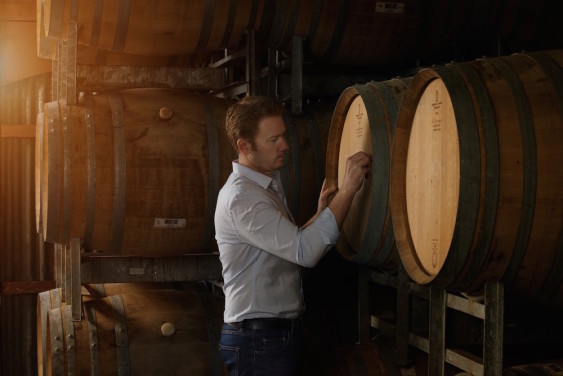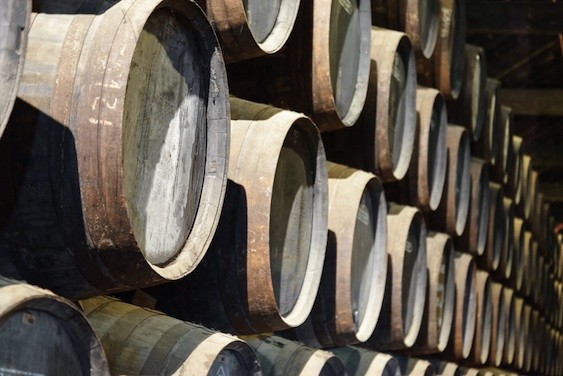We’ve already talked about the reasons winemakers sometimes age wine in oak barrels and the flavors you get from different kinds of barrels. But with the release of a new line of wines from one of Australia’s most iconic wineries, Jacob’s Creek, I thought it might be a good idea to ask their Chief Winemaker, Ben Bryant about the impact oak has on wines.

Bryant is the chief winemaker at Jacob’s Creek and is spearheading the new Double Barrel line.
That’s because the new line is called Double Barrel, and is comprised of red wines that have been aged first in traditional French and American oak wine barrels then in Scotch and Irish whisk(e)y barrels for a whole new set of flavors and textures. Bryant and his team start by selecting prime parcels of Cabernet Sauvignon and Shiraz. After fermentation, the wine is matured in the wine barrels and then transferred to the whiskey barrels. Shiraz gets the Scotch treatment, which lends complexity, smoothness and ripe cherry and chocolate flavors. The Cabernet is put into Irish whiskey barrels to help soften its tannins and develop those rich dark berry flavors.
As you can imagine, Ben had a lot to say about the impact of oak on wine, and the effects he’s seen firsthand from making Double Barrel. In the meantime, you should start seeing the Double Barrel Shiraz and Cabernet Sauvignon on shelves in select US cities soon.
What does aging wine in oak barrels does for the finished product?
Ben Bryant: Aging wine in fine-grained French and American oak barrels has many benefits. One is to impart texture and subtle flavor characteristics from the oak, which can include nuances of spice, toast and vanillin aromas. Second is to enhance the tannins. Wine already has tannins from the grape skins, but when aged in oak barrels these are enhanced by the natural wood tannins for additional structure and to ensure it will age well in a cellar once bottled. Finally, the maturation time in oak barrels allows the wine’s rich fruit flavors to become better integrated with the tannins in the wine for a single seamless experience.
CC: Is there anything special about wines made in Australia, and Jacob’s Creek wines in particular, that affect how they age in barrel?
Ben Bryant: Australian wines are the most delicious, of course, and are a true reflection of where they are grown!
Seriously, though, Australia is blessed with plenty of sunshine and in the southerly regions it has a Mediterranean-like climate that is perfect for growing grapes. Every grape variety expresses itself differently in different climates so perhaps it’s best to talk about Australia’s hero variety – Shiraz.
Australian Shiraz, especially when grown in the best regions such as the Barossa, is typically intensely concentrated with fantastic flavors. And while the summer’s days are warm and dry with plenty of sunshine, the nights are slightly cooler which allows the grapes to ripen evenly. This ensures that the tannins are robust, so good quality Australian Shiraz ages very well when kept under good cellaring conditions. At the same time, the texture of these tannins are velvety soft and smooth so the wines are easy to enjoy upon release.
When selecting wine for our Double Barrel range we specifically look for parcels of grapes that are particularly rich, have intense flavors and are robust, so that the resulting wine will stand up to the double-barreling process of first being matured in traditional wine barrels (French and American) and then being finished in whisky barrels.

For now, the Double Barrel line includes a Cabernet Sauvignon and a Shiraz.
CC: How did you come up with the idea for the Double Barrel line, and why do you think it improves the final wines?
Ben Bryant: Some whiskies are aged in old wine barrels, such as sherry casks. At Jacob’s Creek we are proud of our culture of fostering innovation – so when the idea to age wine in old whiskey barrels came from one of our staff (an American named Jake Wheatley, incidentally), it was brought to life by the winemaking team.
CC: What does using barrels that have been used to age other spirits bring to the wines that traditional barrel-aging does not, and why did you choose Scotch and Irish whiskies?
Ben Bryant: Compared to wine barrels, whisky barrels have narrower staves and are also scorched to a high heat until they are black inside, whereas wine barrels have wider staves and are gently toasted.
The double-barreling technique lends the wines additional complexity and a rounder, smoother mouth-feel. The scorched whisk(e)y barrels impart additional layers of oak complexity, with almond-shell aromas which enhance the sweet vanillin and toasty oak nuances of wine barrels; while the narrower staves of the whisk(e)y barrels means more joins, thus allowing greater oxygen exchange during finishing. As a result the Jacob’s Creek Double Barrel develops more mature characters, with the tannins becoming well-integrated with the rich fruit flavors. Being old barrels, this influence is subtle but discernible.
CC: Why use the double-barrel method on both Shiraz and Cabernet? Why Scotch whisky for the Shiraz and why Irish whiskey barrels for the Cabernet?
Ben Bryant: Through two years of trial and error, our winemakers determined the most suitable kind of whisk(e)y barrels for our Shiraz and Cabernet Sauvignon. Scotch whisky barrels were selected because the rich intensity of Shiraz better suited the more assertive style of Scotch whisky. Irish whiskey barrels were selected because the elegance of Cabernet Sauvignon would be well suited to the smooth style of Irish whiskey. We are keeping the specific distilleries confidential.

The whiskey barrels impart many different flavors from traditional wine barrels.
CC: Do you have a favorite Scotch whisky and/or Irish whiskey yourself?
Ben Bryant: Probably The Glenlivet for Scotch as I really appreciate single malts, and Jameson for Irish. Both are beautifully smooth.

